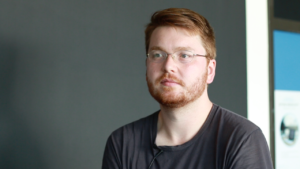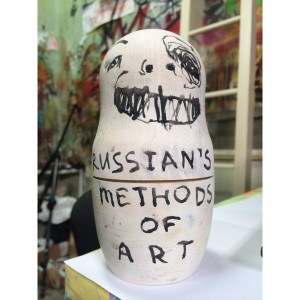PRODUCTION
You know, like we will help people find, you know, like the production team, the crew, or, you know, or who help them with rewrites or the postproduction, finding like, you know the editor. Maybe will even manage all the editing, the postproduction, you know. It just – it kind of depends a lot on, how experienced there are in like filmmaking. And sometimes like we work with the group recently these girls, and it was – I mean, it’s just going to be by them. We did all of the work for them basically. They wrote it though and they performed – they performed in it. So, like intellectually it just fells, it’s theirs, you know. And we made it for DIS, for DIS.art, but it’s like by them, because we didn’t really influence. They don’t normally do videos, you know. But it’s not ours, you know. It’s really very much like – felt like it comes from them, you know. So, that the kind of project, where it’s really easy for one person, to step up and kind of like control, you know, and be that mediator between the liaison on between them and the group, or the editor or whatever. And kind of do the rounds of notes and edits and things like that until it’s done.
Well, I think we find our ideas like kind of the same places everyone else does, you know. Like, it’s – it’s just paying attention to like links, that have been shared or where the conversations are going to. Sometimes we go as far as asking people, who are some new writers, you know. We might write to Simon Denny, who we know knows a lot about like Bitcoin or Amazon and ask him, to send us some names of people that we should look into, that are writing about these things. And, we’ll do the same thing for like, you know Carson Chan, like, who will – he’s an architecture student, you know PhD student, and ask – have conversation with him and, that conversation might lead to thinks like, you know, like – I don’t know, like animals, that can talk. And he sends us links about prairie dogs and like, that they have a word for human and then we’re like look into that research or this. So, it’s really just we do – we kind of try and stay talking to people and seeing, where their work is going and then where it crosses over with our work and then we follow up with questions and ask them for names or links to articles or papers or anything, that’s kind of related, if there is – if there is crossover. So, last year we talked a lot about money, you know. This year we’re talking more about like humans and their impacts in the world and like the, you know, the climate change and things like that. So, that’s a lot of the current stuff, that we’re working on right now. But, we’re trying, to do it – we’re trying to do it in like a non like shocking way, you know – like, I don’t know, we’re not trying to create like more trauma in people, but rather trying change the psychology around that discussion. So, that it’s one of possibility rather than like hopelessness, I think.

















